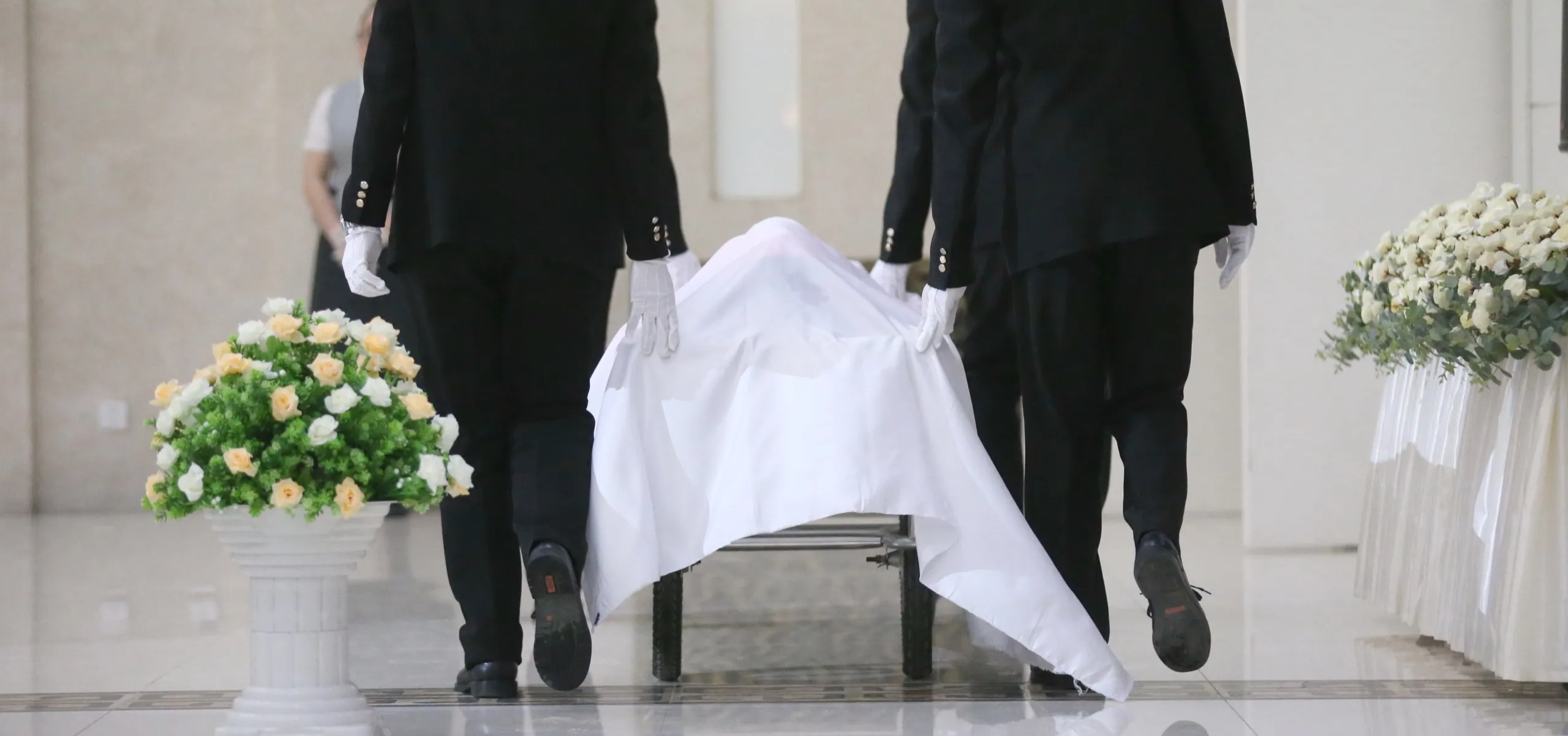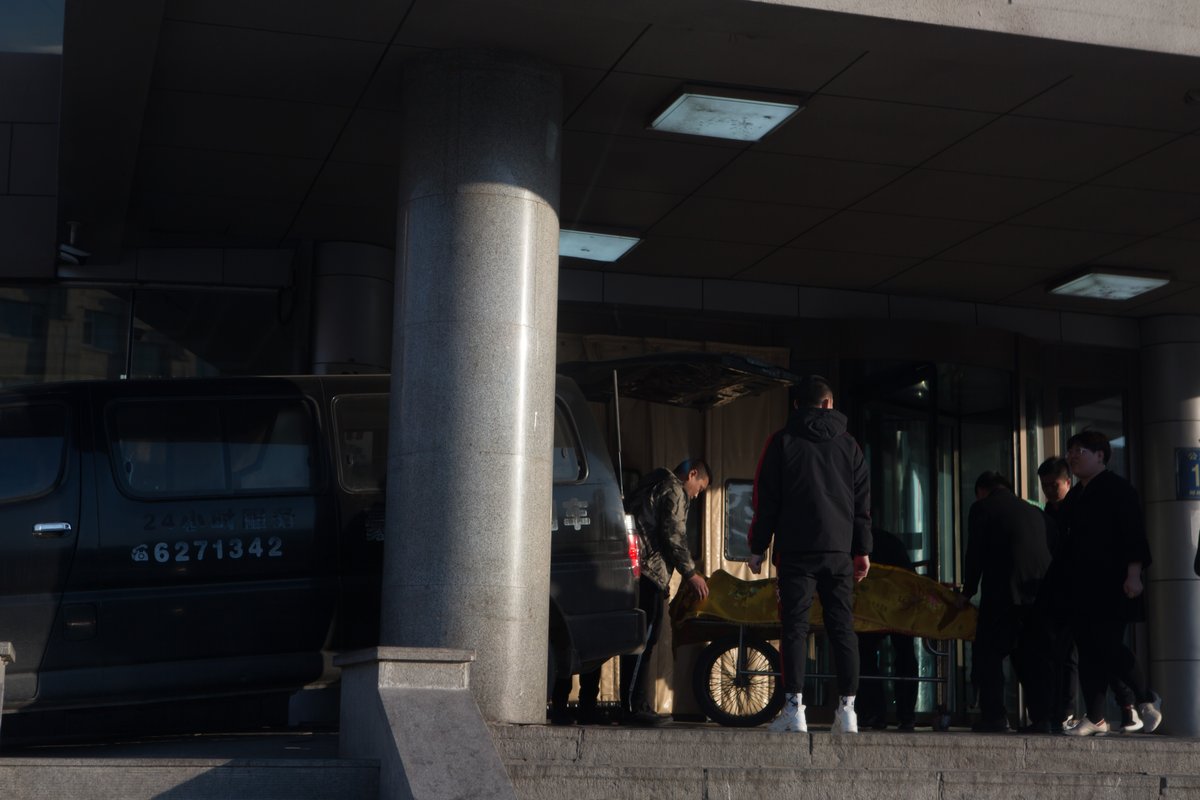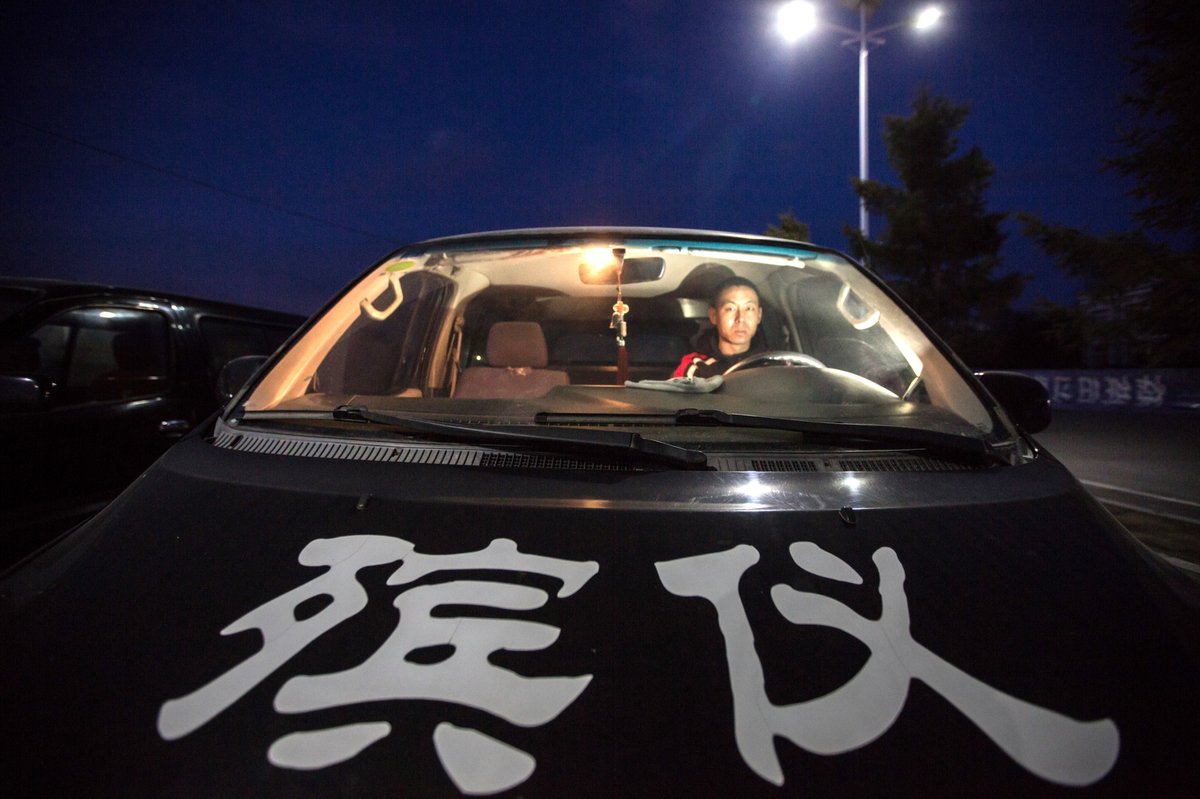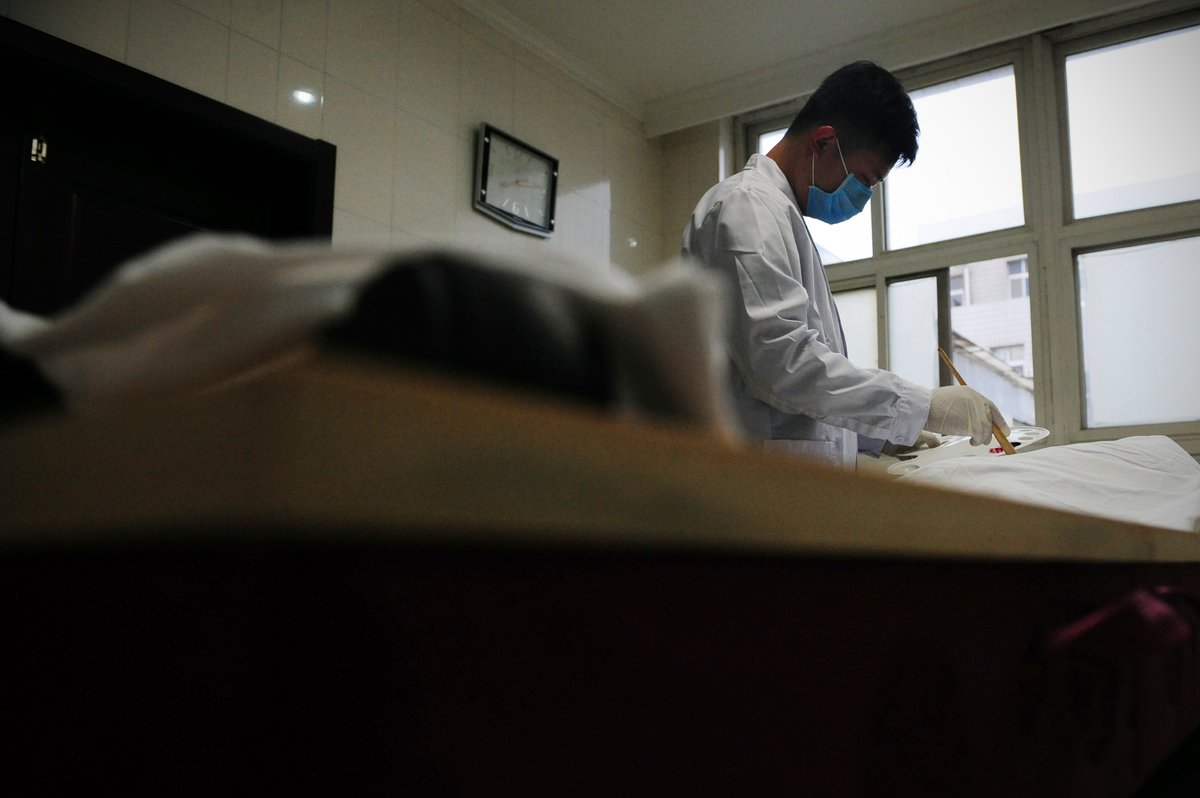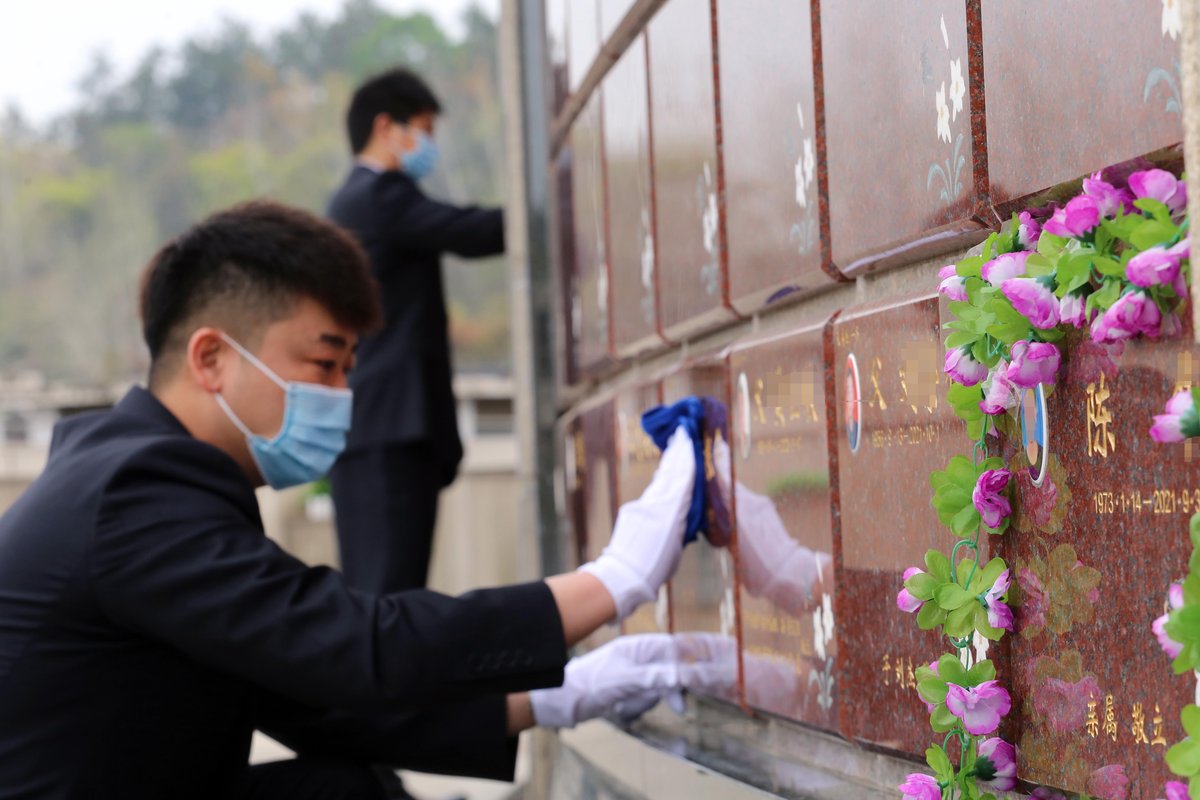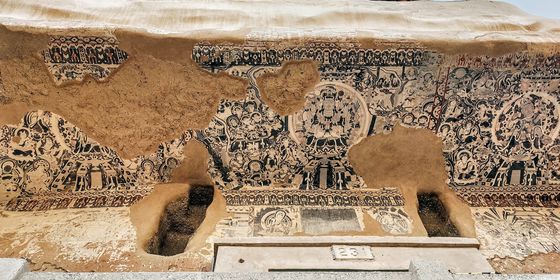Staking out hospitals, meeting body quotas: a “body transporter” shares his memories from the competitive undertaking of death
1 / 8
After I quit my job in 2016, I drifted between work for six months. I delivered express packages and takeout, sold houses, jumped from job to job without making much money. Finally, I summoned the courage to walk into a funeral home and apply for a job as an undertaker. Though the salary wasn’t high—2,200 yuan a month during the probationary period and 3,800 yuan after I passed—the funeral home was state-owned, so it offered various other benefits.
As part of its reforms to the funeral services sector, the city’s Bureau of Civil Affairs had built a funeral home in each district. These were administered by the government and operated as businesses, offering receptions and funerals but not cremation services. My one had just been established; it was still recruiting and training employees, and hadn’t started operating. We spent the first two months of our employment learning funerary knowledge and skills, internalizing the etiquette, and learning industry terms. I painstakingly made my way through a book called Transporting Human Remains.
After two months, the funeral home finally opened. I was part of a six-person transport crew whose job was to collect the remains and bring them to the funeral home. We were paired off, two to a vehicle. My partner’s name was Zhang Hao.
At noon that same day we opened, my team was summoned to pick up a body. Because it was our first job, the director went with us.
The pick-up location was on the 16th floor of the hospital. After arriving, we gingerly loaded the body into a sanitary coffin (a cardboard casket for transporting remains) under the direction of the next of kin. We put the sanitary coffin on a stretcher, then the two of us started carrying the stretcher toward the elevator door.
Since it was lunchtime, many people were using the elevator, and it took forever to arrive. My hands were aching, and fat beads of sweat kept dripping onto the ground. I looked up at Zhang Hao. His face was flushed, veins bulging on his neck, and he was breathing heavily. The director had emphasized during training that placing remains on the ground was the biggest taboo in this line of work, so we had no choice but to keep holding the stretcher up.
After a while, I couldn’t take it anymore, so I begged the director to help. The director was reluctant—after all, this wasn’t his job—but lacking other options, he reached over to hold the middle of the stretcher.
The three of us held out for another 10 minutes before the elevator finally arrived. But after we got on, people kept going up and down. The elevator stopped and started, but it never seemed to get any closer to the bottom—it was the worst experience of my life up to that point. By the time the elevator stopped and we got the body loaded into the van, I felt like a heap of mud.
“This work is inhumane!” I complained to Xiao Yang, a colleague from one of the other teams. Xiao Yang had done this kind of work before. After he heard my story, he doubled over laughing. “Who the hell told you you couldn’t put the bodies on the ground? If you can’t hold them up, what’s wrong with putting them down to rest for a second? Don’t you know you can ask their next-of-kin to help? You’re a grown man, and you’re sweating over that petty shit?”
I had a sudden moment of clarity. After that, I stopped paying attention to what the director told us during training. Sure enough, things got easier.
2 / 8
A month after opening, business was still slow. Our leadership was under heavy pressure. They’d invested tens of millions—when would they ever earn it back? The director thought about putting ads on the display screens of buses and residential or hospital elevators, but they all rejected the suggestion; they thought such advertisements were bad luck.
If we couldn’t promote our services, who in this inconsequential city would hire us to hold a funeral?
In the end, the leadership decided to reach out to the Health Council and coordinate with the hospitals through them. They hoped our business could establish a presence in the three local hospitals. After that, our daily work consisted of aimlessly waiting and staking out a hospital.
The director said, after you’ve parked the van, you should go up to the inpatient units and walk around. When you see someone who might be in need of our services, go over and give them our pamphlets so that they’ll choose us over other funeral homes. I didn’t want to go, because you risk a beating if you walk up to someone and do that. But we had to follow our orders. Every day, we would make a loop around the hospital, take a few pictures to send to our work WeChat group as proof, and then go take a long nap in the van.
We were halfway through the month before we knew it, and we still hadn’t gotten a single job from the hospital. Several people had died at the hospital during that time, but because we weren’t on the scene, their remains were taken by other funeral homes.
The leadership had a talk with us. “Starting this month, each team must complete 10 jobs. It doesn’t matter where you get them—hospitals, neighborhoods, wherever—but if you don’t bring in 10 bodies, you won’t be paid your full salary. For each job you’re short, you’ll be docked 100 yuan. After meeting the quota, you get a bonus of 300 yuan for each additional job.”
“What? Ten jobs a month, easy for you to say!”
“You’ve got to be kidding!”
Everyone started clamoring.
“It doesn’t matter if you snatch or steal—you’ve got to find a way to bring in business. Otherwise we’ll have to shut down, and we’ll all lose our jobs. We’re just getting started. We have to work harder, make more rounds of the hospitals, think harder, talk with more relatives, make friends with more nurses, spend more time in the ICU…after a year or two, when we’ve gotten our name out there, it won’t be so hard anymore…” the director droned on and on.
—
Once we had a monthly quota to meet, we couldn’t screw around anymore.
I sat down and thought about where the bodies were coming from. The most likely places for someone to die in a hospital were, generally speaking, the emergency room, intensive care, the cardiovascular unit, the cancer unit, and geriatric care. This automatically narrowed things down.
I went and printed several hundred business cards, saying that we were a newly opened funeral home run by the Bureau of Civil Affairs; our receptions were sumptuous, facilities comprehensive, rates reasonable, and most importantly, we provided free transport. I gave these business cards to the nurses and aides in those units, asking them to give patients our card when the need arose.
But a week went by, and not a single person called me. Nor did we have any luck roaming the hospital. But the other teams had already brought in several people each. Our chances of meeting the quota were slipping away as I watched, and I felt a burning anxiety.
Then, in a stroke of luck, we met someone who changed our fortunes.
That day, I had just arrived at the hospital when a middle-aged man with a sage-like appearance came up to greet me. He was polite, continually passing out cigarettes. He handed me a business card, saying his surname was Huang and he was a daoshi, a Daoist priest who performed funeral rites, chose dates and cemeteries, and interred the body. If we picked up a body, and the relatives needed someone to speak to the spirit, make sure it moved on, and perform the rites and burial, they could give him a call and he would give us 30 percent of his proceeds.
We exchanged phone numbers. That same night, Huang Daoshi called to invite us to dinner. During the course of the meal, he told us the tricks of the trade. Our eyes lit up. In short, as long as we worked with him and used the sales pitch he taught us, earning 3,000 to 5,000 a month would be a cinch. We didn’t forget to ask him to help us find business, so we could meet our target.
Sure enough, not two days later, Huang Daoshi called to have us help him transport a body.
The location was a nursing home. After we arrived, Huang Daoshi asked us to help him dress the deceased in burial clothes. The whole process took about half an hour, and the burial clothes and dressing fee came out to over 1,500 yuan. When we got back to the van, he slipped me 120 yuan, saying it was in exchange for my help.
After hauling the body back to the funeral home, we breathed a sigh of relief. Our depression lifted.
But this was just the beginning. It was a later incident that gave me a taste of the true benefits of working with a Daoist priest.
3 / 8
That day, the front desk received a phone call asking us to transport a body. The location was a high-end residential building, and we took the elevator to the 28th floor. As I dressed the old man in burial clothes, I asked his daughter, “Do you need a Daoist priest to perform funeral rites and place a talisman for him?
Seeing the befuddled looks of the two daughters, I explained, “Usually, when an older person passes at home, their family gets a skilled priest to perform last rites and help their soul find peace. This helps the soul leave with the body, which brings peace to the household and keeps the children from having nightmares. Of course, if they pass in a hospital, then it’s not needed.”
The two daughters piped up in unison: They didn’t understand, and nor did they know anyone who could perform such services. They asked me if I could recommend someone. I gave Huang Daoshi a call.
Huang Daoshi arrived shortly. Pinching his thumbs and middle fingers together in a mudra, he circled the body once, mumbling a chant. Then he lit some paper money and tossed it into a bowl of water. He sucked the water into his mouth and sprayed it like mist around the body, finally upending the bowl at the head of the bed. He told his hosts, “You must not touch this bowl. After seven days, I’ll come back to unseal it.”
The daughters nodded fervently. Huang Daoshi then pulled a piece of ceramic tile from his bag. He lit a few sheets of paper money on the tile. Holding the tile in one hand and a hammer in the other, he recited a few chants before smashing the tile with a sharp blow. He told us we could now remove the body. After leading us out of the room, he pasted a yellow talisman over the door.
Two security guards stopped us as we walked up to the elevator with the body. “We don’t want to trouble you, but the property management requests that all remains be brought down the stairs. Women and children are easily spooked, we don’t want to traumatize them.”
I naturally refused. The old man weighed almost 100 kilograms, and getting him down 28 floors using the stairs was going to be a hell of a job. I pleaded with the security guards, but they were unmoved. At that point, the daughters came out to ask me to take the stairs as well. I had no choice but to pick up the stretcher and get moving. The stairs to this kind of residential tower are narrow and steep, so we found some rope to tie the sanitary coffin to the stretcher to keep it from sliding around. The two of us carried the stretcher while Huang Daoshi supported it from one side, but even so, we had to rest every couple flights. The daughters looked on without the slightest inclination toward helping.
After we got back to the funeral home, I changed the 240 yuan listed on the invoice to 480 yuan.
Huang Daoshi spent two days performing rites for the deceased in the funeral hall. He charged 5,000 yuan for his services and gave us 1,500 in commission. I finally felt that all my efforts had been worthwhile.
After that, the job came with a perk that was hard to ignore. The commission from referring people to Huang Daoshi was much more attractive than our monthly salary of 3,800 yuan. The transport teams shared a tacit understanding about this, so we put our best efforts into this side of the business. After all, there were many Daoist priests asking us for referrals, and only so many jobs to go around, so we had to hustle as hard as we could.
I lost my old apathy and started to patrol key units of the hospital. As soon as I identified a target, I’d lock in, starting a conversation under the pretense of being another patient’s relative. When the patient died and their relatives went into a panic, we’d appear on the scene: “Where are you preparing to send the deceased? How about the newly opened funeral home? The facilities are excellent, and transportation is free of charge…” If the relatives agreed, we would bring up a stretcher right away. As soon as the deceased was loaded into the van, we’d get to work, recommending that they seek out a Daoist priest.
Of course, we weren’t able to make a referral every time. Some families had their own preferred wise men, while others refused outright. It all came down to luck.
Even though we got some results with this method, we couldn’t spend 24 hours a day waiting at the hospital. Fish were still slipping through the net. So I started giving business cards to the nurses again, encouraging them to tell me right away when a patient passed. I also promised that if we got a job out of it, I would give them 200 yuan in return. I didn’t realize how much trouble this would bring us.
Some nights, I’d be in a deep sleep when the phone would ring: Someone’s coding on such-and-such floor, come and take a look; someone’s passed in such-and-such room, come make your case to the family. We’d rush from our beds as soon as I hung up the phone. Every second mattered, because the situation was constantly changing. If we didn’t appear on time, then someone else might snatch up the opportunity.
Sometimes, even if we showed up, we came away empty-handed. The city funeral home and the two private funeral homes in the next district had longer histories and better reputations. Some family members had their hearts set on using them, and there’d be nothing we could do. Most of the time, we kept trying to convince them until they lost their patience and yelled at us. Only then would we slink off with our tails between our legs.
It was easy to take these methods too far. One time, I came within inches of getting beat up.
4 / 8
That day, I was in the intensive care unit waiting on a job. The doctor had already let the family know that the patient was deteriorating, and might last only another couple of hours. The patient’s wife, a middle-aged woman, was heartbroken at this news. She called her son, saying his father was nearing death. Should they send him to a local funeral home or back to his hometown? She asked her son to come quickly and discuss this.
I kept looking for an opening to talk with her, but it never came. And when I got back from a trip to the bathroom, she was gone.
I couldn’t let the opportunity slip away, so I stayed put.
After half an hour or so, five or six people walked out of the elevator, led by a man in his 20s. He was wiping away tears as he walked—I assumed this had to be the sick man’s son.
When he went out to the balcony, I followed and handed him a cigarette. He took it and lit up. Thinking the moment had arrived, I cautiously ventured, “Where are you planning to send him?”
He looked at me in confusion. “What do you mean?”
I tried again. “After your father leaves the hospital, where will you be sending him?”
He still didn’t understand. “What do you mean? After my father leaves the hospital?”
I pulled out a business card and handed it to him. “Brother, let me leave you a phone number. We’ve just opened, we’re an official unit under the Bureau of Civil Affairs. After your dad passes, you can call me directly. Transport is free of charge…”
His tone changed as soon as he saw the “Funeral Services” heading on the business card. He threw the card in my face and yelled, “Are you fucking crazy? I hope your dad dies! I hope your whole family dies!”
I was taken aback. “Earlier I heard the doctor say your dad was about to pass, that he had two hours left at most, and to have you make funeral arrangements…”
“If you keep spouting nonsense, you better believe you’ll pay!” He cocked his fist as he finished speaking.
Seeing that something was wrong, I turned tail and fled. Just then, the people who came in with the young man came crowding up around me. I didn’t have time to wait for the elevator, so I made a dash for the stairs. From behind me, I could hear the man saying that my funeral home was grubbing for business, getting rich off the dead. A crowd of people chased me down the stairs, yelling that they were going to teach me a lesson. They chased me for three floors, and by the time I got down to the ground floor from the 14th, I was still in a state of panic.
Only later did I realize that the man wasn’t even the patient’s son, but the son of another man who’d just arrived in the ICU after a car accident. In my hurry to close the deal, I’d gone after the wrong person.
After that, it was a long time before I went looking for business again.
The incident became a cautionary tale that made its rounds in the funeral home. My colleagues all fell silent when they heard it.
We were already discriminated against due to our contact with human remains. Now we also had to deal with people’s disgusted glares when we showed up to a job. It was hard to take, but we had to keep at it. Our station received no government funding; we were entirely on our own financially, and our leadership couldn’t think of better ways to bring in customers. During this period, the director invited some experts from Taiwan to come give lectures about better practices, but it did nothing for the business.
Hundreds of people enter the hospital every day. At a glance, how could we know who was about to die, and who would go home to die? And even if we identified target customers, it’s hard to speak up when you’re face-to-face with grieving relatives. I could hardly bear it.
When we got together, we’d often discuss new ways to promote the business. One colleague had the laughable idea of printing “Funeral Services” in big letters on our uniforms and sitting right outside the entrance to the hospital—those in need would naturally seek us out. But in the end, he didn’t have the guts to do it. He only changed his WeChat handle to “Funeral Home Manager” and promoted the business every day in his Moments feed. In the end, he actually managed to attract two customers this way.
I couldn’t copy his methods; I didn’t have the gall. After my painful experience, I started mulling things over and seeking my colleagues’ advice: How can you figure out which hospital patients are about to die, and which ones are out of the woods? What sales pitches work best with bereaved relatives and keep them from turning away in disgust? What are some subtler ways of letting people know about our business?
5 / 8
Within half a year, two colleagues who’d started at the same time as me had been fired. They had colluded with an outside florist to arrange casket flowers for families who held funerals at our parlor, and secretly charged for funerary supplies. For our business, this was the equivalent of a high-voltage line: If you touch it, you’re out. By then, I had shed my own innocence as well, becoming a sly fox with a trick for every situation.
Sometimes, when I didn’t have the opportunity to approach potential clients, I would pretend to be one of the patient’s loved ones and ask the doctor for updates on their condition. Of course, this ruse could only be used a few times before the doctors and nurses caught on. Sometimes, if we lingered too long in the wards, they’d even come out and make us leave.
The most frustrating thing was that no matter how we wheedled or bribed, the doctors and nurses wouldn’t bite. I didn’t understand, so I asked a cousin of mine, who was a doctor. He said, “We doctors are always trying to save people, but you’re waiting for them to die. How could we work together? We don’t care what happens to people after they die, so it’s no use coming to us.”
After that, I focused my efforts on the nurse’s aides. They were the lowest-ranked workers in the hospital, so they were less likely to pass up the chance to earn a referral fee of 100 or 200 yuan.
—
It wasn’t just wrangling my sources; I also became an expert at communicating with the families of the deceased.
One day, I had just walked up to the hospital entrance when I heard an old lady on the phone, saying her husband was at death’s door, come get the clothes ready. My ears pricked up right away. When she hung up and started walking toward the inpatient wards, I hurried to follow.
The old lady walked up to a room. A patient was lying on bed in the middle of the room, with tubes in his nose, mouth agape. A solemn-faced man was sitting in front of the bed. I sat by the door, waiting for a chance to strike up a conversation, but the two of them were preoccupied with cleaning the patient’s body and tidying his clothes. After almost getting beat up, I wasn’t about to barge in there to talk to them. But I also couldn’t sit outside waiting forever.
Then I spotted a pen by the patient’s bed. In a stroke of inspiration, I called Zhang Hao. After a whispered discussion, I pulled out a business card and the two of us walked into the room together.
I asked the man, “Brother, do you have a pen? I’d like to write down a phone number.”
The man picked up the pen and handed it to me. I purposefully leaned over the bedside cabinet and started to write my other phone number on the card. The man standing by the bed glanced over. When I was sure that he had seen the striking “Funeral Home” heading, I handed the card to Zhang Hao. “Make sure to save this card. After your friend passes, call me right away. Don’t listen to what the nurse aides tell you—their burial clothes are expensive and the dressing isn’t professional. You don’t want to get ripped off. If you can’t get through to the phone number on the card, you can call the number I wrote on the back. I guarantee we’ll arrive within 20 minutes.” Zhang Hao took the business card, agreeing.
Our little performance seemed to have the intended effect. As soon as I left the room, the man came running up behind me, saying, “You’re from the funeral home?”
I turned around and said yes, yes we were, and gave an overview of the services we covered. The man asked polite questions about receptions, funerals, and cremations, and I answered each in turn. Zhang Hao stood to one side and continued playing his role as a friend of a patient at death’s door.
The patient passed that same night, and sure enough, the family called us right away. I successfully referred them to the Daoist priest. In all, we made about 3,000 yuan in commission.
As my colleagues’ standard of work improved, another problem arose: competition. In a small city like ours, there was a limited number of corpses. At times, we were competing not only with other funeral homes, but also with other teams from our own business. We racked our brains for ways to meet the quotas and make referrals, leading to quite a few funny incidents.
6 / 8
Late one night, I received a phone call from a client saying his mother had passed. I immediately called Zhang Hao and started running to the garage.
Even though I had already negotiated this job with this client outside the ICU, the unit had a scheming nurse aide—we’d once gotten into an argument over one of my jobs. I feared that the aide would undermine me by speaking poorly of the funeral home in front of family members and ruining all my groundwork.
I sped all the way there, almost hitting another vehicle at an intersection. When we got to the hospital, we picked up the sanitary coffin and ran for the elevator. But when we exited the elevator and turned the corner, we were dumbstruck—another team from our business, Xiao Zhang and Yu Wei, were waiting outside the room. They also had a coffin and stretcher in front of them.
The family members standing outside the door stared at us as we approached. “And you are?”
I pulled out my phone. “You were the ones who called me. Why did you notify them as well?”
A relative turned and asked Xiao Zhang, “Who asked you to come?”
Xiao Zhang smiled. “The nurse aide was the one who informed me. He said you were going to use our funeral home’s services, and I didn’t know that you had reached out to someone else. Don’t worry, we’re all one unit—it doesn’t matter who does the transport.”
The relative was incensed. Pointing at Xiao Zhang’s nose, he yelled, “Get the fuck out! Only one person in our family died, and you brought two teams. Are you hoping someone else dies?” Xiao Zhang shot me a glare, then picked up their team’s stretcher with Yu Wei and left.
I stood to one side with Zhang Hao, barely breathing. In our area, it was a huge taboo to bring two coffins if only one person had died. We dressed the deceased in burial clothes, placed the body into the coffin, and loaded the van. The whole time, we didn’t dare say a single word.
I was willing to let it pass, but when we got back to the funeral home, Xiao Zhang and his teammate were waiting to pick a fight. They insisted that we had stolen their gig. I was also angry—I had negotiated this with a relative in advance, and he had even called me personally. How could he say I had taken his business? But they wouldn’t let it go, and even reported it to the director, who looked like he didn’t know whether to laugh or cry.
The truth was that this kind of thing had been happening more frequently in the past couple months. The most frustrating thing was that the leadership didn’t seem to care. They weren’t bothered if we undercut each other, as long as the business got another customer. They said that we wouldn’t lose these opportunities if we put in our time at the hospital. But this attitude cost us dearly. We were already putting in the work of finding leads, and now we had to deal with sniping from our own colleagues.
When things blew up this time, the director couldn’t keep ignoring the issue. He held a company meeting, telling us that going forward, we would have to report to the service desk before transporting a body. Whoever reported first would get the job. Because I had put in the effort to arrange this particular job, it would count as mine.
7 / 8
With our sales efforts, business got better and better. At the same time, our quotas were changing: What had once been “10 bodies a month per team” became “six bodies a month per person,” and calls that came through the front desk no longer counted toward our quotas. The pressure was on.
The reason behind these rules was clear: It was to keep people from slacking off. Someone must have complained to higher-ups, saying they did all the hustling on their team while their partner sat back and benefited. But from another perspective, this drove a wedge between partners and created competition within the teams themselves.
Not long after, this competitive culture gave rise to a melodramatic incident.
That night, I had just gotten into bed when Huang Daoshi called, asking me to help transport a body. Zhang Hao and I shot out of bed and ran for the van. We were still one body short of our quota that month, and if we got this job, we could breathe easier.
When we arrived at the destination, the ambulance had not left yet. There was a van from the city funeral home parked next to the ambulance, and the staff asked what we were doing there. I said that the Daoist priest had called us. He laughed maliciously. “You really are something, aren’t you? You’re even coming for our business now.”
I could only force a laugh. Our teams were out hustling all over the city; of course they must have heard about us long ago. But we weren’t there to make trouble, just to wait quietly for the bereaved. After all, no matter how we argued, it was still up to them to decide where they wanted to go.
Shockingly, another van from our funeral home pulled up. The three teams looked at each other in dismay—a perfect comedic moment.
Just then, the employee responding for loading the body into the ambulance finished dressing the body in burial clothes, and the bereaved relative came out to have us take the stretcher in. But he stopped in his tracks upon seeing three funeral home vehicles parked outside. And to our greater surprise, it turned out that this relative worked for the Bureau of Civil Affairs. After he processed what he was seeing, he blew up, repeatedly asking who had called us there.
The three teams finally sorted it out: The city funeral home had been called by the relative himself; I came because the relative’s elderly mother had called Huang Daoshi, and Huang had called me; my colleagues had been called by the ambulance employee. Those low-paid workers were happy to do this kind of thing—make a phone call, and if it works out, you get 200 yuan.
After making sense of the situation, the relative didn’t say anything to our team. He instead unleashed a torrent of abuse on the emergency worker and the other team from our funeral home.
Naturally, we didn’t get the job this time, and left it to the city funeral home. They had a clear advantage, being able to do cremations in addition to receptions and funerals.
The affair wasn’t finished yet. That relative later called the hospital to complain about the ambulance worker, and then called our director personally to settle the score. The director couldn’t deflect responsibility to us because he was the one who’d set the policy, so he had to swallow the blame himself.
8 / 8
Hustling aside, my primary role as a funeral home worker was still transporting human remains.
I remember one time, I got the order to pick up a rotted corpse. Even from a distance, I could smell the stench of death. We were fully equipped with protective masks and clothing, and I had mentally prepared myself, but the scene was still a shock. The body was fully decayed, its liquids pooled on the ground. Even worse, the corpse was crawling with maggots.
I felt all the hairs on my body stand up. We exterminated the maggots with bottle upon bottle of disinfectant before dragging the corpse into a body bag. We used five layers of bags and placed the body in a sanitary coffin, but the nauseating odor kept wafting out. We loaded up the van, opened all the windows, and sped toward the crematorium.
We received 6,000 yuan for that trip. Fortunately, the family was kind to us, thanking us over and over.
After we got back to the funeral home, we handed over all the money. The astonishing thing is that the director then lashed out at us, asking why we didn’t bring the remains back to the funeral home to be buried. As we didn’t, the job wouldn’t count toward our quota. I felt a chill in my heart. That corpse killed my appetite for two days, but in the end it wouldn’t even count. Did I really want to stay in this job in the long run?
—
A year and a half went by, and business kept improving. More people knew about us, and the two illegal private funeral homes had closed down. The director stopped sending us to stake out the hospitals. I felt a sense of release: I’ll have my quiet life transporting bodies of the deceased, with the occasional modest commission from referring someone to a Daoist priest—that’ll do just fine.
But my hopes were dashed before long. The funeral home made new rules prohibiting us from making referrals of Daoist priests to families of the deceased, and violators would be fired immediately. On top of that, they promoted three people into business manager roles; they would now be responsible for making sales.
The transport teams were heavily impacted by these policy changes, but what could we do? A business can only mature by adopting regulations, but once things were standardized, there was no place for our side hustles. After some thought, I decided to quit. I bought a used vehicle and took a job transporting hospital patients who were being discharged or transferred.
With my experience hustling for the funeral home, this new job was a breeze. After all, when you’ve got the gall to make a sales pitch about death, no problem is too big for you in life.
All names used in the story are pseudonyms.
Written by Ru Ge (如歌)





